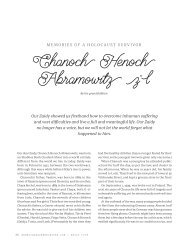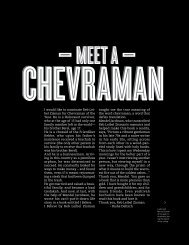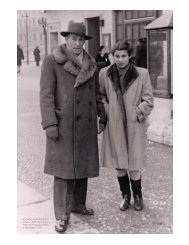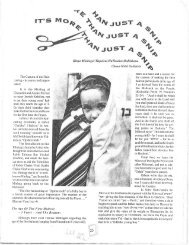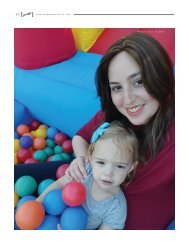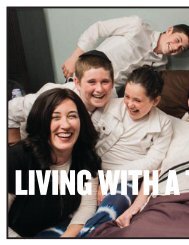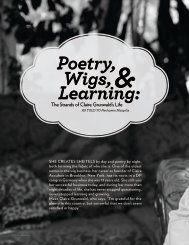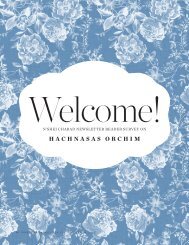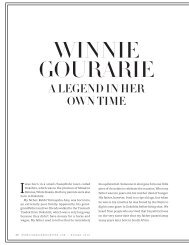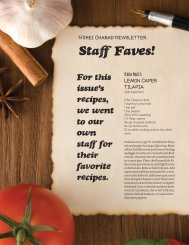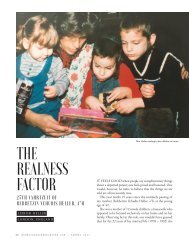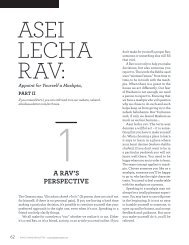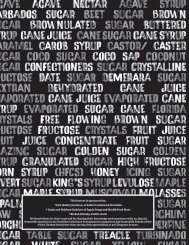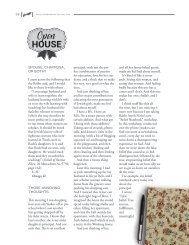The Sounds of the Shofar
The Sounds of the Shofar, by Eliza Tizagbar, September 2012
The Sounds of the Shofar, by Eliza Tizagbar, September 2012
Create successful ePaper yourself
Turn your PDF publications into a flip-book with our unique Google optimized e-Paper software.
This article is based on a talk given by Eliza Tizabgar at <strong>the</strong> Chabad <strong>of</strong> Nor<strong>the</strong>rn Palm Beach<br />
Island Jewish Women’s Circle annual dinner on February 12, 2012.<br />
In 1952, my parents, Ebrahim Tizabgar and Miriam<br />
Tizabgar nee Derakhshan, got married in Israel while still in<br />
<strong>the</strong>ir mid-teens. My oldest sister was born in Israel.<br />
However, <strong>the</strong>ir families were back in Iran, and my parents<br />
were having trouble acclimating to <strong>the</strong> lifestyle in Israel. So<br />
<strong>the</strong>y moved back to Iran, to <strong>the</strong> capital city, Tehran, when<br />
my mo<strong>the</strong>r was pregnant with me and my twin bro<strong>the</strong>r,<br />
Nasser. She did not know she was having twins. By <strong>the</strong>n she<br />
was 18 and my fa<strong>the</strong>r was 19.<br />
I grew up in Tehran under <strong>the</strong> Shah regime. <strong>The</strong> Shah<br />
supported Israel and allowed us freedom <strong>of</strong> religion. We had<br />
our temple and freedom <strong>of</strong> speech. On Friday nights, my<br />
parents would have 50-60 people, family and friends, over<br />
for <strong>the</strong> meal. My mo<strong>the</strong>r cooked for everyone.<br />
In Iran, Friday was <strong>the</strong> <strong>of</strong>ficial day <strong>of</strong>f and Saturday was<br />
like Sunday here, so Friday and Saturday was <strong>the</strong>ir weekend.<br />
This worked very well for us, as on Friday nobody was<br />
expected to work so we could help my mo<strong>the</strong>r prepare for<br />
Shabbat. We loved that.<br />
I grew up celebrating all <strong>the</strong> Jewish holidays and going to<br />
a Jewish school. We had teachers from Israel who taught us<br />
to read and write Hebrew. We prayed to G-d every morning<br />
before class.<br />
ElizaTizabgar<br />
Palm Beach, Fla.<br />
<strong>The</strong> <strong>Sounds</strong> <strong>of</strong> <strong>the</strong> Sh<strong>of</strong>ar<br />
Even single girls covered <strong>the</strong>ir heads for prayer. (See<br />
photo <strong>of</strong> us covering our heads for prayer.)<br />
<strong>The</strong> Muslims didn’t want <strong>the</strong> Shah to stay in power<br />
because he was modern and supportive <strong>of</strong> freedom <strong>of</strong><br />
religion, and that’s when <strong>the</strong> revolution happened. On<br />
January 16, 1979, <strong>the</strong> Shah was exiled and left Iran.<br />
I was a teenager <strong>the</strong>n. I left Iran and went to Israel to visit<br />
my mo<strong>the</strong>r’s fa<strong>the</strong>r, and I knew I never wanted to go back to<br />
Iran. I extended my ticket and <strong>the</strong>n extended it again… and<br />
never went back.<br />
My parents stayed in Iran. I moved to Paris.<br />
I had a desire to learn French and to work in <strong>the</strong> fashion<br />
industry. I did all that, but I did not feel that Jews were very<br />
welcome in France. I had heard that in <strong>the</strong> USA you can be<br />
free and be yourself, unafraid <strong>of</strong> anti-Semitism, so I moved<br />
to New York. Things were very bad in Iran, so I worked with<br />
a Jewish organization to bring my family to New York. We<br />
succeeded, thank G-d, and <strong>the</strong>y came to this country in 1988<br />
and started a new life in this country. <strong>The</strong>y settled in Great<br />
Neck and practice <strong>the</strong> same Judaism that we always had<br />
practiced.<br />
Because <strong>of</strong> my career (business management), I was<br />
transferred from New York to Palm Beach, Florida, and
suddenly I found myself without my family and <strong>the</strong> support<br />
to keep Jewish practice in my life. But my love for Judaism<br />
always remained alive within me. I tried many different<br />
synagogues but didn’t feel at home in any <strong>of</strong> <strong>the</strong>m, and <strong>the</strong><br />
values and practices that I grew up with were missing.<br />
<strong>The</strong>n one Rosh Hashanah afternoon, on <strong>the</strong> holiday, just<br />
before sundown, I was closing my store on Worth Avenue<br />
and a rabbi and his two tiny daughters stopped on <strong>the</strong> street,<br />
asked me if I was Jewish, and <strong>of</strong>fered to blow <strong>the</strong> sh<strong>of</strong>ar for<br />
me.<br />
I accepted <strong>the</strong>ir kind <strong>of</strong>fer, and <strong>the</strong> rabbi took out his<br />
sh<strong>of</strong>ar right <strong>the</strong>re and <strong>the</strong>n and began blowing it. Listening<br />
to <strong>the</strong> sounds <strong>of</strong> <strong>the</strong> sh<strong>of</strong>ar reminded me <strong>of</strong> <strong>the</strong> Judaism that<br />
I used to know, that I missed so much.<br />
<strong>The</strong>y invited me for Shabbat services and dinner and I<br />
knew <strong>the</strong>n that G-d was giving me all <strong>the</strong> blessings and<br />
direction I was looking for to practice my Judaism again.<br />
Who would have thought that on a sidewalk in front <strong>of</strong> my<br />
store, in middle <strong>of</strong> Palm Beach, I could reconnect with<br />
G-d and His Torah, His gift to <strong>the</strong><br />
Jewish people?<br />
Ebrahim and Miriam, at <strong>the</strong>ir wedding in<br />
1952.<br />
<strong>The</strong> rabbi who I met was Rabbi Zalman Levitin. His wife,<br />
Hindel, has become one <strong>of</strong> my dearest friends. And about<br />
<strong>the</strong>ir four daughters, I warn you, don’t ask, or I’ll start<br />
showing you some <strong>of</strong> <strong>the</strong> thousands <strong>of</strong> pictures I took <strong>of</strong><br />
<strong>the</strong>m because <strong>the</strong>y are just so sweet and beautiful.<br />
When my twin bro<strong>the</strong>r and I were born, my<br />
grandmo<strong>the</strong>r always said to my mo<strong>the</strong>r, “You<br />
already have a girl, who needed ano<strong>the</strong>r girl?<br />
Give me <strong>the</strong> boy to hold.” So, my mom would dress me up<br />
like a boy so my grandmo<strong>the</strong>r would hold me and love me a<br />
little, too. I grew up feeling that women were inferior.<br />
Today, I understand, through <strong>the</strong> many programs <strong>of</strong> <strong>the</strong><br />
Jewish Women’s Circle, and all <strong>the</strong> Torah classes and events<br />
that I attend, that a Jewish woman has much value and<br />
importance in Judaism. I understand now that women are<br />
not just precious human beings, as precious as men, but that<br />
as keepers <strong>of</strong> <strong>the</strong> home <strong>the</strong>y have even a more important job<br />
than men, because <strong>the</strong> woman is <strong>the</strong> source <strong>of</strong> Judaism for<br />
her family and her friends. She teaches everyone around her<br />
and creates <strong>the</strong> entire atmosphere in <strong>the</strong> home, which extends<br />
to <strong>the</strong> street, <strong>the</strong> school, <strong>the</strong> job. Her influence is <strong>the</strong> most<br />
effective and is <strong>the</strong>refore primary.<br />
Being part <strong>of</strong> Chabad has been life-changing for me. It<br />
streng<strong>the</strong>ned my belief in Hashem, my confidence in myself<br />
as a Jewish woman and my outlook on life. I now have<br />
mezuzot on all my doors, I study Torah with passion, I light<br />
Shabbat candles every Friday before sundown, I celebrate<br />
Shabbat at Chabad and I celebrate all <strong>the</strong> holidays, I give<br />
tzedakah <strong>the</strong> way <strong>the</strong> Torah teaches which is to give not<br />
just when I have extra money, but even when things are<br />
tight. I try to get o<strong>the</strong>r women to join Chabad programs<br />
also because I want to share <strong>the</strong> blessings I have found.<br />
Eliza (L) and her twin bro<strong>the</strong>r Nasser.
Eating kosher is a big mitzvah; so is keeping Shabbat,<br />
all 25 hours. Am I doing all this perfectly? No, not yet, I am<br />
still on my own journey as we all are and I am learning<br />
more and more.<br />
I am always planning and trying to take on more<br />
and more Torah and mitzvot. I tell my friends and all<br />
Jewish women I meet, “You are welcome to join me<br />
in all <strong>the</strong>se beautiful mitzvot and make G-d proud <strong>of</strong><br />
you by celebrating who you really are.”<br />
No matter where you come from, you should be<br />
proud to be a Jewish woman. Wherever you go you<br />
will have <strong>the</strong> power to influence o<strong>the</strong>r people to<br />
become closer to G-d. Remember to<br />
nourish your neshamah,<br />
your<br />
Eliza, with her biggest fans, <strong>the</strong> Levitin children.<br />
soul, by doing more and more mitzvot… bringing light<br />
into your life, your home, and into <strong>the</strong> whole wide world. n<br />
Rabbi Zalman Levitin affixing a mezuzah on Eliza’s<br />
store on Worth Avenue<br />
Eliza receiving shmurah matzah at her store.
Eliza Tizabgar and Rivka Levitin dressed in <strong>the</strong><br />
Hawaiin spirit at <strong>the</strong> Purim in Hawaii seudah.<br />
L-R: Eliza,Hindel and Lila at Chanukah party.<br />
Eliza, fourth from left, at <strong>the</strong> Caffeine for <strong>the</strong> Soul<br />
women’s Chassidus class held weekly at Starbucks.<br />
Simple <strong>Sounds</strong>, Powerful Message<br />
Rabbi Michoel Gourarie<br />
Very soon, on Rosh Hashanah, we will hear <strong>the</strong> sounds<br />
<strong>of</strong> <strong>the</strong> sh<strong>of</strong>ar once again. Our sages teach us that sh<strong>of</strong>ar<br />
blowing is what Rosh Hashanah is all about. What is so<br />
special about <strong>the</strong>se seemingly simple sounds?<br />
<strong>The</strong> sh<strong>of</strong>ar is blown throughout <strong>the</strong> service in various<br />
different ways. But it always follows <strong>the</strong> same pattern: We<br />
always begin by blowing a tekiah - a long straight sound.<br />
This is followed by a teruah (or shevarim) - short, broken<br />
up, sob-like sounds. <strong>The</strong>se sounds are followed by yet<br />
ano<strong>the</strong>r long tekiah.<br />
This is <strong>the</strong> formula: Tekiah - Teruah - Tekiah.<br />
A great Chassidic rabbi, <strong>the</strong> Sfas Emes, explained that<br />
this pattern tells <strong>the</strong> story <strong>of</strong> our life journey, and<br />
expresses <strong>the</strong> power <strong>of</strong> Rosh Hashanah.<br />
<strong>The</strong> long, smooth tekiah is a symbol <strong>of</strong> purity,<br />
innocence and perfection. On <strong>the</strong> o<strong>the</strong>r hand <strong>the</strong> broken<br />
teruah sounds are <strong>the</strong> challenges <strong>of</strong> life. <strong>The</strong>y represent<br />
darkness, confusion, complication and frustration.<br />
Our life begins with a tekiah. We are born with a<br />
natural purity, with an untainted soul that is perfect and<br />
unchallenged. <strong>The</strong> innocence <strong>of</strong> a newborn baby reflects<br />
<strong>the</strong> purity and holiness <strong>of</strong> <strong>the</strong> soul.<br />
But inevitably, sooner or later, <strong>the</strong> long and beautiful<br />
tekiah is replaced by <strong>the</strong> broken sounds <strong>of</strong> <strong>the</strong> teruah. We<br />
begin to experience confusion, face difficulties, and are<br />
suddenly thrown into <strong>the</strong> ups and downs <strong>of</strong> a complicated<br />
and sometimes challenging existence.<br />
But this is <strong>the</strong> power <strong>of</strong> Rosh Hashanah. When we<br />
begin a fresh new year, <strong>the</strong> past is not always so positive.<br />
Not everything in <strong>the</strong> last year might have been a tekiah.<br />
But on this special day we can turn it all around. We can<br />
learn from last year’s experiences and make <strong>the</strong> future<br />
more positive. We can turn challenge into opportunity;<br />
transform <strong>the</strong> bad into good and darkness into light, using<br />
difficulty and confusion as growth tools to emerge as<br />
stronger and deeper human beings.<br />
And so we conclude with a tekiah again. Out <strong>of</strong> <strong>the</strong><br />
teruah emerges a greater, stronger and deeper tekiah than<br />
<strong>the</strong> one we began with. Light that comes from darkness is<br />
brighter than natural light. Smoothness and purity that<br />
emerges from challenge is deeper and stronger that <strong>the</strong><br />
natural innocence that we experience at birth.<br />
Hence <strong>the</strong> sh<strong>of</strong>ar pattern: Tekiah - Teruah - Tekiah.<br />
Rabbi Michoel Gourarie is <strong>the</strong> director <strong>of</strong> BINA, a<br />
Sydney-based organization that provides Jewish<br />
inspiration and learning for all ages and backgrounds.<br />
BINA’s programs include weekly classes, educational<br />
emails and videos, a Jewish lending library, and one-onone<br />
learning.




